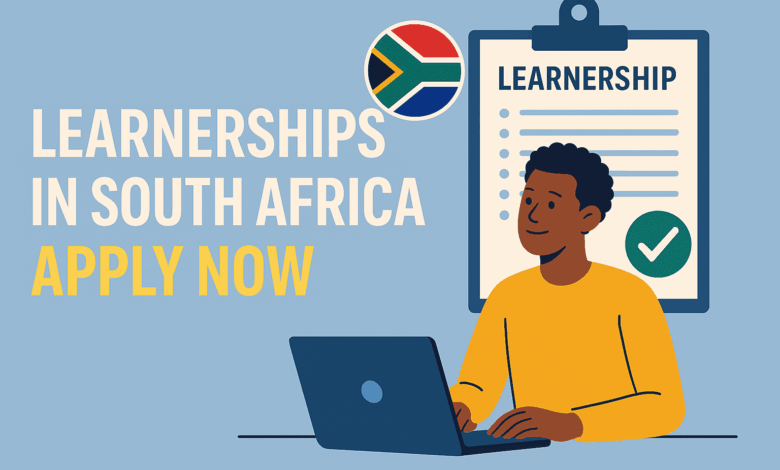
In today’s competitive job market, gaining work experience and formal qualifications can be challenging especially for young South Africans. Fortunately, learnerships in South Africa offer a practical solution by combining structured learning with hands-on work experience. Whether you’re a matriculant, unemployed youth, or career changer, this article will guide you through everything you need to know about learnerships in South Africa, including benefits, eligibility, how to apply, and where to find current opportunities.
What Are Learnerships in South Africa?
Learnerships in South Africa are structured learning programs that lead to a nationally recognized qualification. They are governed by the South African Qualifications Authority (SAQA) and regulated by the Sector Education and Training Authorities (SETAs).
These programs consist of:
- Theoretical training (usually delivered by an accredited training provider)
- Workplace experience (hosted by a registered employer)
Upon successful completion, participants receive a National Qualifications Framework (NQF) certificate — a valuable asset when entering the job market.
Key Benefits of Learnerships in South Africa
Participating in a learnership offers several advantages, particularly for those who lack work experience or formal education.
Main benefits include:
- A nationally recognized qualification
- Monthly stipend or allowance during training
- Hands-on work experience
- Improved employability
- Potential job offer after completion
- No cost to the learner (funded by employers or SETAs)
These benefits make learnerships in South Africa a practical and accessible option for youth empowerment and skills development.
Who Qualifies for Learnerships?
Eligibility criteria may vary by industry and program, but in general, learnerships in South Africa are open to:
Basic eligibility:
- South African citizens between 18 and 35 years old
- Unemployed individuals or recent matriculants
- People living with disabilities (specific programs are available)
- Those who meet the minimum education requirements (e.g., Grade 10, 11, or 12)
🔎 Tip: Some learnerships require prior knowledge or experience in the field, but many are designed for beginners.
Types of Learnerships in South Africa
Learnerships are available in nearly every economic sector. Each program is aligned with a specific NQF Level, ranging from basic to advanced skills.
Popular sectors offering learnerships in South Africa:
- Finance and Banking: ABSA, Standard Bank, Nedbank
- Retail and Sales: Shoprite, Pick n Pay, Massmart
- Information Technology: Vodacom, Microsoft, Amazon
- Engineering and Construction: Eskom, Transnet, Murray & Roberts
- Healthcare and Pharmaceuticals: Netcare, Dis-Chem, Clicks
- Government and Public Services: Department of Labour, Municipalities, SARS
How to Apply for Learnerships in South Africa
To apply for a learnership, you need to follow a series of steps to ensure your application is valid and competitive.
1. Prepare Your Documents
Have the following documents ready:
- Certified copy of ID
- Certified copies of academic qualifications (e.g., matric certificate)
- Updated CV – READ: How to Write a South African CV That Gets Interviews
- Proof of residence
- Medical certificate (if applicable for disability learnerships)
2. Find Accredited Learnerships in South Africa
Search for opportunities through:
- Official company websites (e.g., Shoprite, Eskom, Vodacom)
- Government platforms such as SAYouth.mobi and Department of Labour
- SETAs (e.g., BANKSETA, CATHSSETA, MICTSETA)
- Job portals like MzansiWork.com, Careers24, and Indeed
Avoid job scams: Never pay to apply for a learnership. Legitimate opportunities are always free.
3. Apply Online or Submit via Email
- Follow the instructions in the application notice. Some companies provide a link to an online application form, while others may request applications via email or hand-delivered forms.
4. Prepare for Interviews or Assessments
If shortlisted, you may be invited for:
- Aptitude tests
- Interviews
- Medical checks (if required)
Frequently Asked Questions About Learnerships in South Africa
How long do learnerships last?
- Most learnerships in RSA last 12 to 24 months, depending on the program level and complexity.
Will I get a job after completing a learnership?
- While employment is not guaranteed, many employers absorb successful learners into permanent roles. Having experience and an NQF qualification makes you more attractive to future employers.
Can I apply for more than one learnership?
Yes, you can apply for multiple learnerships — just ensure each application is tailored and meets the specific criteria.
Top Companies Offering Learnerships in South Africa (2025)
| Company | Sector | Website |
|---|---|---|
| Eskom | Engineering & Energy | eskom.co.za |
| Shoprite | Retail | shopriteholdings.co.za |
| Vodacom | IT & Telecoms | vodacom.com |
| Netcare | Healthcare | netcare.co.za |
| Department of Labour | Government | labour.gov.za |
Learnerships in RSA play a critical role in bridging the gap between education and employment. They empower youth, build skills, and increase access to job opportunities — all while offering financial support and nationally accredited qualifications. If you’re ready to take the next step in your career, start by applying to a learnership that aligns with your goals. The sooner you begin, the sooner you build a better future.